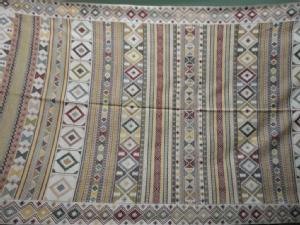Kantilal Samatbhai Vankar
(Samatbhai's son)
|
Age: 42 Education: Class 10, (Secondary School Certificate) Residence: Sarli Date of interview: 26/5/2012, Sarli |
Gujarati Summary: Download |
A shawl by Kantilal |
Interview Summary
Kantilal has pursued a career in weaving since 1986, following four generations of his family. Kantilal learnt weaving from his father. Recounting earlier times, Kantilal told us that plain cloth for the Patel community was the main cloth woven and was sold by peddling from village to village. His father used to make dhabda (thick woollen blankets) for the Khadi bhandar (Khadi selling shop) and loodi (veil like cloth) for the Rabari community women too. Departing from working with these product lines, Kantilal became involved with making shawls. From the 1990s, the family introduced new styles of weaving and Kantilal attempted to expand the family business. The first foreign contract was made in 1994 through the export order of Garvi Gurjari, and lasted for two years. Now he and his brothers (Laljibhai and Narain Bhai Chaganbhai) and his elder brother’s son Mukesh are all engaged in the craft. Twenty-four year old Mukesh has completed the second year of a BA and is now a student of Kala Raksha; he has completed four out of six semesters. Kantilal finds Mukesh’s training at Kala Raksha very useful as it has encouraged the further development of new designs and new colour combinations, encouraged innovation, and developed the family’s knowledge of qualities.
Kantilal now oversees a truly developed transnational business enterprise, comprising contacts in Malaysia, Brazil, Milan, Paris, London, Colombo and Singapore. His business does not operate on a direct selling basis, but is centred on procuring bulk orders during exhibitions in the cities. From 1998, they started dispatching these large consignments and Kantilal himself attended the Dubai festival in 2001. Most of their retail sales take place during the exhibition. Kantilal recounted that tight timescales put in place by foreign customers put his production under tremendous pressure however. In a stressed tone, he explained that foreign buyers place bulk orders with a limited time span to account for quickly-changing fashions. He feels helpless to work strictly to these as weaving is time-consuming and complex process; something that many foreign buyers fail to understand. As one example, importers from Finland placed an order totalling 6,000 pieces, which Kantilal could complete but not to the desired quantity, largely due to time constraint, which then displeased the importers. Kantilal adds that they need around six months’ time to complete an order, but fashions could, of course, change during that period.
To meet orders of the foreign clients, Kantilal employs between sixty and seventy workers, both male and female. Some 100 to 150 women of their village and other settlements in the vicinity (chiefly Vandhay Thakrai) are also employed to do embroidery and mirror work on shawls, and are paid on a per piece basis. Although many modern motifs are now common, a number of much older patterns continue to be woven. The business is currently thriving and the three brothers have divided the work as per their expertise.
The variety of shawls produced range from 250 to 30,000 rupees. They have had an agreement with FabIndia for the last four years, who demand wool- and cotton-based products in particular. They only hire highly-skilled weavers and although they offer good rates, their quality control is extremely stringent. Mainly their orders are completed during April to September/October, and thereafter Fab India launches them in their winter collection. Whenever a special order has to be met, the workers’ labour charges also increase. Kantilal’s business accounting is extremely transparent right from the investments, the labour cost and the final profit.
Kantilal, like Shakeel Khatri, feels that the weavers from Bhujodi get more customers. His family have struggled to bring Sarli to prominence as a weaving village but this is changing. The family has won awards in 1996 and 2006 (at national level) for the best collection. In 2009, Kantilal’s brother Naraninbhai won an award. Such awards are immensely sought after and the honours are important for continued involvement in government exhibitions.
Kantilal’s ancestors were originally from Mudhan in Abdasa Taluka, a village situated near Lakhpat and Pandhro. A dispute in the village forced the family to migrate to Sarli. Initially they were engaged in farming but shifted to weaving many generations ago.
For Kantilal, formal education is most important for communication skills and in order to become self-reliant. He also supports education when it comes to the opportunities it brings to visit distant places. For his son Chetan (class 10) to learn the business, Kantilal will first teach him the basics of weaving, however, as without it, he believes he would not do the business justice. Around fifty to fifty-five families in Kantilal’s village follow weaving and his family has earned good reputation among them. His father is a leading figure in the community and his elder brother is also a member of the community core committee. Kantilal strongly believes that the business will continue to thrive under the new generation.
*See also the interview of Samatbhai, Kantilal's father.

